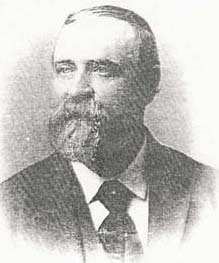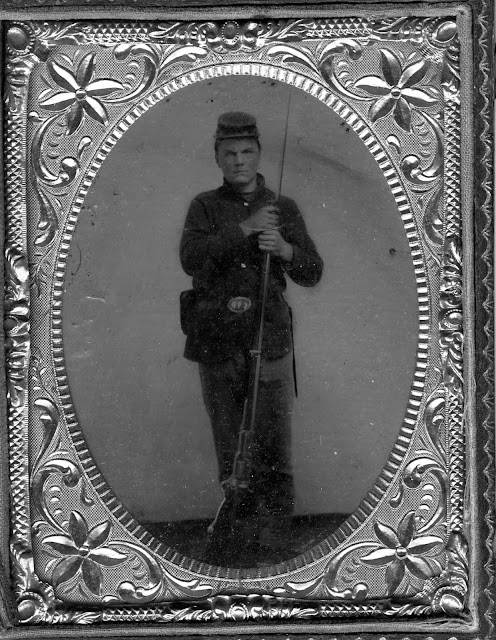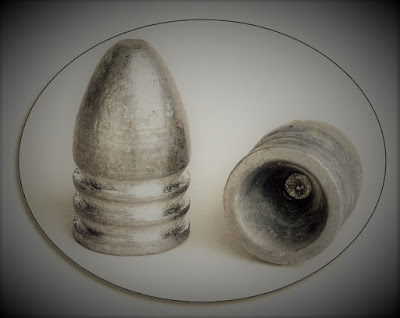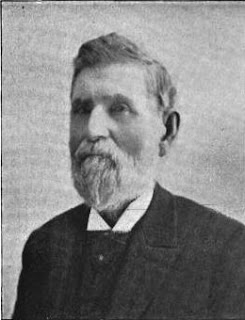The Purloined Letter: A Georgian Officer on the Gettysburg Campaign
The following letter, written by Captain William E. Simmons of the 3rd Georgia Sharpshooters in the immediate aftermath of the Gettysburg campaign, was discovered at Raccoon
Ford in the Shenandoah Valley at the residence of a Dr. Stringfellow by Second Lieutenant
Joseph Balsley of Co. D, 27th Indiana Infantry who gave it to a
citizen of Dayton, Ohio, who then allowed Dayton
Daily Journal editor William Bickham to publish it in the October 15, 1863
edition of his newspaper. Simmons' letter was addressed to a cousin and some interesting observations of how Northern civilians reacted to the Confederate invasion of the north in the summer of 1863.
 |
| Major William E. Simmons |
A short biography of Major Simmons as provided by
SCV Camp No. 96 of Lawrenceville, Georgia: “William Eleazar Simmons was born
August 26, 1839 in Lawrenceville, Georgia. He graduated from Emory College at
Oxford, Georgia in 1858. In March of 1861, he volunteered for the first company
of infantry that was organized in Gwinnett County and was elected a 2nd
Lieutenant. Major Simmons first served in Company I, 16th Regiment, Georgia
Infantry and later commanded Company C, 3rd Battalion of Georgia Sharpshooters,
Confederate States Army. Simmons participated in approximately 20 battles with
the Army of Northern Virginia including Yorktown, Lee's Mill, Seven Days
Battle, Malvern Hill, South Mountain, Antietam, Fredericksburg,
Chancellorsville, The Wilderness, Second Manassas and Gettysburg. He also
participated in The Knoxville Siege, Spotsylvania and Cold Harbor.
Major Simmons
was never wounded but was captured August 16, 1864 near Front Royal, Virginia.
He was first sent to the Old Capitol Prison in Washington, D.C. then after a
week he was transferred to the Fort Delaware Prison which is called the
'Andersonville of the North'. He refused to take the oath as long as there was
a Confederate Army in the field, despite the threat of hanging. He was released
in July of 1865. In August of 1865 the Federal Government struck the 'Freely
and Voluntary' phrase in the oath. He then took the oath. After the war he
studied law and was admitted to the bar in March of 1867. He was elected
Solicitor General six weeks later. He married December 16, 1869, living to
celebrate his sixtieth wedding anniversary. Major Simmons served as a Trustee
of the University of Georgia for 32 years and later served 12 years as a Georgia
Tech Trustee. In appreciation of his war service, the State of Georgia offered
him a Confederate Soldier's pension. Major Simmons, however, would never accept
the pension. He died January 29, 1931 at age 91 and is buried in the Historic
Shadow Lawn Cemetery in Lawrenceville, Georgia.”
Bunker
Hill, Virginia
July 20,
1863
My dear cousin:
If
I were to attempt to give you the minutiae of our peregrinations from the time
we left Culpeper until our return to Virginia, I know you would consider my
letter an intolerable and inconsiderate tax upon your patience. Furthermore, I
presume, the newspapers have kept the public fully enlightened as to all the
general and important movements and operations of our army since crossing the
Potomac.
From Culpeper, our corps marched
direct to Williamsport, Maryland crossing the Blue Ridge at Ashby’s Gap.
Nothing of interest occurred until we reached the latter point when our
division was called out to assist Stuart’s cavalry- the letter having been
badly thrashed by Buford and Kilpatrick and in full retreat in the direction of
our camp on the Shenandoah. We had just waded the water the day previous and
you can very readily suppose that we were about in the right humor to fight our
own and the Yankee cavalry too when compelled to recross the next day. It was
near sun down when we got into position and too late to accomplish anything
that evening. The night was an exceedingly uncomfortable one as we lay in line
of battle with our wet clothes on and no fires to warm by and that on top of
the mountain. At daylight we advanced upon the enemy but the sight of the
infantry was sufficient and they beat a precipitate retreat. So, we had nothing
to do but turn around and perform the delectable task of fording the Shenandoah
River again, the third time in two days. I see that Stuart in his official
dispatch to General Lee claimed a victory and so did Hooker at Chancellorsville
and McClellan at Coal Harbor and White Oak Swamp. God save us from all such
“victories.”
We reached Williamsport a little after
noon on the 25th ult., crossed the river, and marched to Hagerstown,
a distance of six miles that evening where we encamped for the night. The
wealthy and intelligent portion of the population of that part of Maryland by
our army are undoubtedly of Secesh proclivities, though the poorer classes
still cling with unyielding tenacity to the glorious Union. It is needless to
say the latter have an overwhelming majority at the latter box. I am satisfied,
too, that this sickly cant about “poor, downtrodden Maryland” so often indulged
in by our papers and people is not appreciated by those “oppressed” wretches
upon whom it is so lavishly bestowed. Maryland is exactly where she ought to
be, because a majority of her people desire to remain beneath the protecting
aegis of that celebrated piece of bunting- the Stars and Stripes. If that is
their wish, we certainly have no inclination to interfere or object.
From Hagerstown we marched directed to
Chambersburg, passing through Middleburg and Greencastle. The Pennsylvanians
seemed anxious to see the Rebels after they ascertained that we were not such a
savage, bloodthirsty and God-forsaken set as they had been taught to believe.
Some of the men were quite talkative, though the majority was rather distant
and reserved. The women looked as sour, glum, and solemn as the people of my
country do when there has been a still house burned in the neighborhood. This
part of the population made a considerable display of Union flags on their
bonnets and dresses to which, I am proud to say, none of our troops paid any
attention. We expected to them all loyal to “the best government the world ever
saw” and therefore there was no necessity for them taking so much pains to
assure us of the fact.
At Chambersburg some of the women were
quite polite and ladylike in their deportment when they met us in the streets,
while others set their countenances off by giving their nasal appendages a
somewhat perpendicular slant. Whether they intended this as an insult to the
Rebels or their delicate organs were offended at their own filth “the deponeth
saith not.” I suppose that I saw at least 2,000 women in Pennsylvania and to
tell you the honest truth I did not see half a dozen with clean clothes on out
of the whole number. A majority of these people seemed in comfortable
circumstances at home. Two-thirds of the women, old and young, were barefooted
and did not care to conceal the fact as they generally mounted the fences to
look at us as we passed their houses. In point of intelligence and general
information but few of them are equal to our house servants at the South.
If you went to their houses to buy
anything from them, they seemed perfectly willing to give you everything they
had so you “spared mine life and hoss.” I am satisfied that a Dutch Yankee
thinks decidedly more of his “hoss” than he does of his woman- the very
euphonius appellations the most of them make use of when speaking of their
wives or fraus. The best evidence we have of the fact is that they hold their
stock in higher estimation than their families is that their barns, including
stables, stalls for cattle, etc. are built of finer material and display three
times the taste and architectural skill exhibited in the construction of their
dwellings. Every man who has 20 acres of land and but few exceeding 50, no
matter if he shelters himself and family in a miserable kennel 15’ x 20’, has a
barn of gigantic proportions situated on the best location for a building of
any description about the premises, beautifully decorated with ornamental work
and built of the best material in the country and purse of the owner could
afford. It is a wonder they don’t go further and endeavor to amuse their stock
by ornamenting the walls of their palatial structures with fresco painting,
representing forest scenes with sparkling brooklets meandering through their
shady recesses, green pastures, and mountain scenery for a background and by
way of showing, if possible, these worthy animals the vast distinction made
between themselves and their owners, it would be a good idea to add correct
representations of the habitations of the two parties. A Dutchman would think
this quite a source of gratification to his “hoss.”
None of our infantry forces penetrated
further into the state than Carlisle and York. Our corps remained two or three
days at Chambersburg from which point we marched direct to Gettysburg, passing
on the route the Caledonia Iron Works owned by Thaddeus Stephens, for many
years a popular and influential leader of the radical abolition party of the
north. When Thaddeus returns to Caledonia he will find his property converted
into an ash bank.
The advance of our army- the corps of
Ewell and Hill- encountered the enemy in the vicinity and in possession of
Gettysburg. The fight proper opened on the morning of the 1st. The
enemy were driven four miles that day, suffering heavily in killed, wounded,
and prisoners. No troops were engaged on the 2nd until 5 o’clock in
the evening when our corps attacked the enemy’s left. This charge is said to
have been the finest and most gallant made by any corps of this army since its
organization. General Longstreet expresses this as his opinion. The forces of
the enemy engaged by us were composed almost entirely of regulars and the New
York Fire Guards. For a while they resisted with great stubbornness, many of
our men joining with them in a hand to hand fight, as the bayonet wounds of
many of our brigade now in the hospital, amply attest. This is the first
instance that I have heard of where any considerable number of the two armies crossed
bayonets and is also an event of rare occurrence in the history of all wars.
We drove the enemy more than a mile
when darkness put an end to the conflict. The point at which our line halted
was at the foot of a rugged and almost inaccessible mountain where the enemy’s
reserve line was strongly entrenched. I believe we could have carried the
position by storm but at a terrible sacrifice of life. Our generals acted
sensibly in not attacking this position and it is a pity that General Lee gave
battle at a point where the enemy had such a decided advantage in ground, when
he could have forced him to fight us in a position of our own selection. As it
was, we had a decided advantage so far as the result was concerned. We held the
battlefield two days and remained on it a day after the enemy had left. Their
loss in killed and wounded far exceeded ours. On that part of the line where we
fought I knew they lost ten to our one though in other portions our army
suffered much heavier. Where our troops attacked and were repulsed, they
suffered heavily and vice versa. This is invariably the case.
We captured something over 13,000
prisoners, 5,600 of whom we paroled at Gettysburg, while we brought 8,000 back
with us to this side of the Potomac. These refused parole at Gettysburg,
assigning as a reason that our army being on northern soil, their officers
would not respect their paroles but force them to fight again before exchanged.
So far as the fighting qualities of the Yankees are concerned, I saw no
material difference in their courage in Pennsylvania and Virginia. As usual,
some of them acted very gallantly, while others did not. The same may be said
of our army.
Our casualties must reach as high as
15,000 and I believe will exceed that. The loss of the enemy was undoubtedly
much heavier. A large proportion of our wounded are but slightly injured,
indeed the proportion of our slightly wounded is much larger than was ever
known before. I think the raids of last summer and this will satisfy General
Lee’s inclinations to invade. While we were not defeated in battle either time,
yet the fact is undeniable that General Lee failed to accomplish the object he
had in view. Besides this, the movement has done the Confederacy incalculable
harm. The Federal administration was at a loss how to recruit their army and
supply the vacancies of those whose terms of enlistment had expired. True,
their act of conscription furnished a remedy but that measure was so
exceedingly unpopular that Lincoln was afraid to enforce it for fear of
formidable resistance by the people.
Of course, this invasion of their soil
created great indignation throughout the entire north and aroused the national
pride of the entire population. The result of this has been to recruit the
Yankee army, an object the accomplishment of which has given their government
no little trouble and uneasiness and which every species of persuasion and even
the star-spangled oratory so popular and effective with these people, had
failed to accomplish. But as we have just received orders to pack up, I must
close. We move in the direction of Berryville.
My
address is: Capt. W.E. Simmons, 3rd Ga. Bat., SS, Wofford’s Brigade,
McLaw’s Division
To read more of the wartime experience of William E. Simmons,
I recommend that you check out Joseph P. Byrd’s book “Confederate Sharpshooter
Major William E. Simmons: Through the War with the 16th Georgia Infantry and
3rd Battalion Georgia Sharpshooters” which is available through Mercer University Press.










Comments
Post a Comment